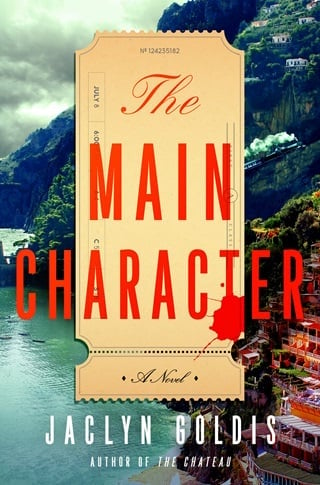Chapter One Ginevra
For Ginevra Ex, bloody, murdered bodies were par for the course. Ginevra had poisoned and stabbed with the best of them. She’d decapitated, shot, and even had a victim killed while skydiving (framed as an accident). The New Yorker had called that one “ingenious.” But a murder conducted by pen—blood contained to a page that was summarily flipped—well, that was quite different from standing over the dead body of someone you loved.
Ginevra averted her eyes from the face caught midscream. How had it come to this? How?
Ginevra had been especially proud of her latest book. She’d spun pages with characters still tangy on her tongue. Characters closely inspired by people who existed in real life. Then she’d arranged those unsuspecting people on this very train. She had awaited this moment, the end of their journey in sight. The perfect trip. Culminating in the sweet, sweet End.
In the end, it wasn’t as she’d intended. Not even close.
Because dead. Not alive.
The train chugged along, the treetops whizzing by in a black, bushy haze, and in the darkness and her grief, Ginevra felt her footing give way. She was fifty-nine, but she lumbered as someone decades older, her limbs laden in flesh, not sprightly enough to quickly catch herself. Instead she toppled down onto the body, cheek to blood. She gagged a bit, but still she reached over, grappling across the still chest. For a hug.
Their first.
Her own flesh and blood.
She clutched the body to hers. Still disbelieving. How in the world had it come to this?
Ginevra was a plotter, after all. Not a pantser. Plotting versus pantsing—that eternal vociferous debate used by writers to distract themselves from just sitting down and doing the damn thing. While all those midlist authors, whose names no one would ever know, bandied about pros and cons of writing methods, Ginevra—the wealthiest author in the world after J. K. Rowling—simply wrote. Furiously. Successfully. Stratospherically. One book a year, starring her main character du jour. Always an instant #1 New York Times bestseller, except for her most recent publication, a disappointing launch that had hardly taken the literary world by storm and had even left her off the bestseller lists. The book had garnered a barrage of angry, critical reviews alleging the murder was flawed, the twists too obvious, the main character a cardboard cutout. Worse yet—that Ginevra was losing her golden touch. But oh, how she’d planned to redeem herself with her latest manuscript and its grand finale: this trip on the Orient Express. Ginevra had assembled all her characters, meticulously dropped clues, laid all the traps. Tightened the noose.
But she hadn’t foreseen this.
She scooted back from the body. Tears mingled with her heavy black winged eyeliner and mascara, applied always from the middle of her eye rather than the inner corner, exactly like her idol, Sophia Loren. Although in every other way, Ginevra was the opposite of Sophia Loren. Ginevra was tubby and short, barely grazing five foot, with hair once chestnut but now her signature purple red. Her skin was mottled, and her nose crooked—like a rugby player, her twin sister, Orsola, had once said, wriggling her own pert nose. Orsola also had warm brown eyes with tiger flecks. Ginevra’s eyes were black, the color of those deep foreboding lakes that policemen trawl for dead bodies in the movies.
Ginevra’s vision clouded as minuscule mascara flecks irritated her pupils. Again, she wrangled herself across the parquet and caressed the forehead—still warm.
She strangled a sob.
She’d been so certain it would work, her meticulous plan to give Rory—and the rest of them—the perfect trip. Ambitious, fiercely protective Rory. An old soul. Occasionally too determined and bighearted for her own good. Ginevra’s latest, and finest, main character.
All Ginevra had wanted to do was save Rory. To make decades of wrongs, right.
And so Ginevra had plotted and planned, but somewhere along the way, her eagerness, her confidence, her old but raw pain had bested her. Run roughshod over her clarity of mind.
Ginevra had forgotten the cardinal rule: Often characters have a mind of their own.
And characters are prone to hiding secrets—from the author and from each other. Secrets that take pages to untangle. The majority of the book to tease out until you yelp a little surprise.
Oh!
Sometimes it doesn’t matter that you’ve lined it up perfectly, all the acts, all the beats—the twisty, perfect lead-up to that critical character’s final zig.
Because instead of zigging, they zag.
 Fullepub
Fullepub 



